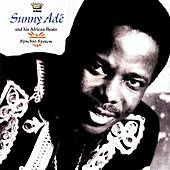King Sunny Adé
| King Sunny Adé | |
|---|---|
 |
|
| Background information | |
| Birth name | Sunday Adeniyi |
| Also known as | King of Juju, Sunny Ade, Minister of Enjoyment |
| Born |
22 September 1946 Oshogbo, Osun State, Nigeria |
| Genres | Jùjú |
| Occupation(s) | singer, performer |
| Instruments | vocals, multi-instruments |
| Years active | 1960s–present |
| Labels | I.R.S. Records |
"King" Sunny Adé (born Sunday Adeniyi, 22 September 1946) is a Nigerian musician, singer-songwriter, multi-instrumentalist, and a pioneer of modern world music. He has been classed as one of the most influential musicians of all time.
Adé was born to a Nigerian royal family in Ondo, thus making him an of the Yoruba people. His father was a church organist, while his mother was a trader. Adé left grammar school in Ondo under the pretense of going to the University of Lagos. There, in Lagos, his mercurial musical career started.
Sunny Adé's musical sound has evolved from the early days. His career began with Moses Olaiya's Federal Rhythm Dandies, a highlife band. He left to form a new band, The Green Spots, in 1967. Over the years, for various reasons ranging from changes in his music to business concerns, Sunny Adé's band changed its name several times, first to African Beats and then to Golden Mercury.
In the 1970s and 1980s Adé embarked on a tour of America and Europe. His stage act was characterised by dexterous dancing steps and mastery of the guitar.
After more than a decade of resounding success in his native Nigeria, Adé was received to great acclaim in Europe and North America in 1982. The global release of Juju Music and its accompanying tour was "almost unanimously embraced by critics (if not consumers) everywhere". Adé was described in The New York Times as "one of the world's great band leaders", in Record as "a breath of fresh air, a positive vibration we will feel for some time to come" and in Trouser Press as "one of the most captivating and important musical artists anywhere in the world".
His next album, Syncro System (1983), was equally successful and earned him his first Grammy Award nomination in the ethnic/traditional folk recording category, and making him the first Nigerian Grammy award nominee ever
Sunny Adé's music is characterised by, among other instruments, the talking drum – an instrument indigenous to his Yoruba roots, the guitar and his peculiar application to jùjú music, that would easily put him in the same class as guitar musicians like Santana. His music is in the age-old tradition of singing poetic lyrics ("ewi" in Yoruba) and praise of dignitaries as well components of Juju (traditional African belief) called the Ogede (casting a spell). Hence, Adé's music constitutes a record of the oral tradition of his people for posterity.
...
Wikipedia
